Journal club offers opportunity to improve teaching practices
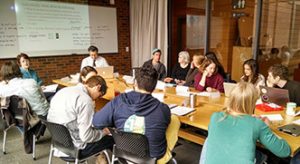
Science classes are as old as academia, but a program at the UO is helping science instructors hone some new tricks to engage nonscience majors in their courses.
The University of Oregon’s Science Teaching Journal Club is a partnership between the Science Literacy Program and the Teaching Engagement Program. It brings faculty members and students together to discuss strategies and methods for engaging more students in science, technology, engineering and math courses.
Unlike most journal clubs, the participants don’t meet solely to critique and debate the points of their readings. Instead, they evaluate articles and research about teaching science and study broader teaching methods to incorporate into their teaching.
Read the full article on Around the O.
Find a permanent PDF version here.
UO earns grant to strengthen STEM education
When it comes to improving education in science, technology, engineering and math, one challenge UO educators have been wrestling with in recent years has been coordinating curricula among different STEM majors.
Thanks to a “mini-grant” from the Association of American Universities’ Undergraduate STEM Education Initiative, project leaders will be working over the course of the next few years to align curricula across different STEM majors. The UO was one of 12 universities named on Feb. 20 as part of a cohort of AAU member campuses committed to improving undergraduate STEM education.
Read the full article on Around the O.
Find a permanent PDF version here.
Read the AAU grant press release.
Find a permanent PDF version here.
UO’s science literacy program cultivates scientific curiosity
The program strives to improve science literacy by providing instructors and graduate students with effective teaching methods. Rather than lecturing, SLP instructors are encouraged to build an inquiry-based teaching style to promote student curiosity and engagement. “The biggest things are about trying to shift the mindset from it being the instructor delivering information to the students working through the information themselves,” graduate education mentor Austin Hocker said.
Read the full article on the Daily Emerald.
Find a permanent PDF version here.
UO biologist Judith Eisen elected into elite American academy
By Jim Barlow, University Communications
April 23, 2018
 UO biologist Judith Eisen is best known to the world as a pioneer in using zebrafish as a model to study the nervous system.
UO biologist Judith Eisen is best known to the world as a pioneer in using zebrafish as a model to study the nervous system.
On campus, in addition to her research, she played a lead role in establishing the Science Literacy Program and has influenced how faculty members teach in biology, chemistry and biochemistry, physics, geological sciences and human physiology.
Read the full article on Around the O.
Find a permanent PDF version here.
It’s an incredible time to be studying STEM fields at many of Northwest’s Largest Colleges:
STEM Changes underway at University of Oregon
By Bruce Sussman
January 28, 2018
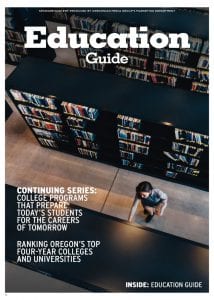
The University of Oregon is also doing some unique things in STEM studies, developing an award-winning Science Literacy Program. The program is designed to make science study relevant and successful for both science majors and non-science majors who have to take science courses.
Read the full article online at the Oregonian.
Find a permanent PDF version here.
Summer Institute on Scientific Teaching 2017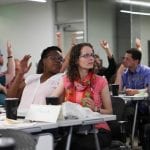
By Molly Blancett
July 25, 2017
Even teachers need to go back to school, especially when it comes to learning how to teach science better.
That’s an idea the University of Oregon has embraced with such gusto it has become a leader in efforts to make science classes more effective and engaging. And interest is spreading, from veteran professors to young doctoral students and post-doctoral fellows.
Read the full article online at Around the O.
Find a permanent PDF version here.
Elly Vandegrift – Thomas F. Herman Award for Specialized Pedagogy
May 23, 2017
Elly Vandegrift, senior instructor of biology and associate director of the Science Literacy Program, was recognized for her constant and astonishing dedication to education in the Department of Biology and the Science Literacy Program. In the words of department head Bruce Bowerman, “Eleanor is bringing us together to explicitly and deliberately focus on how we can systematically improve both our curriculum and our approaches to teaching.” In recognition of her achievement and expertise in the area of science literacy, Elly Vandegrift was a recipient of a 2017 Thomas F. Herman Award for Specialized Pedagogy.
Read the full announcement from Academic Affairs.
Find a permanent PDF version here.
These scientists study plants and animals by land and sea
By Bethany Brookshire
December 6, 2016

Some people love learning about science, but others suffer through their science classes. Vandegrift wants to change that. She’s an ecologist who runs the Science Literacy Program at the University of Oregon in Eugene. Her goal, she says, is to make science classes “interesting, accessible, engaging and relevant for all students.”
Read the full article online at Science News for Students.
Find a permanent PDF version here.
Nicola Barber Joins UO Science Literacy Program
October 2016
Nicola Barber’s research career began by looking at genetic diversity in sockeye salmon while spending the summer 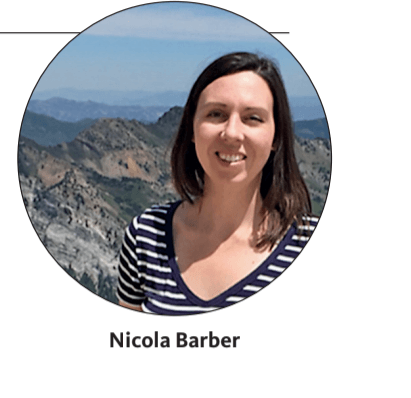 in her hometown of Victoria, British Columbia. Hooked on research, she spent the next three years at Colgate University applying genetics and cell biology to uncover a connection between nuclear pores and cell-division machinery in budding yeast. The project brought her to the National Cancer Institute in Maryland for six months, where she worked with collaborators and a robot named Rascal to perform high-throughput genetic analyses. She returned to the West Coast for her PhD in molecular cell biology at the University of California at Berkeley. A turning point in Nicola’s career occurred the first time she stepped to the front of the classroom as a graduate student instructor and discovered her enthusiasm for education.
in her hometown of Victoria, British Columbia. Hooked on research, she spent the next three years at Colgate University applying genetics and cell biology to uncover a connection between nuclear pores and cell-division machinery in budding yeast. The project brought her to the National Cancer Institute in Maryland for six months, where she worked with collaborators and a robot named Rascal to perform high-throughput genetic analyses. She returned to the West Coast for her PhD in molecular cell biology at the University of California at Berkeley. A turning point in Nicola’s career occurred the first time she stepped to the front of the classroom as a graduate student instructor and discovered her enthusiasm for education.
Read more about Nicola Barber’s career, research interests, and future goals.
Find a permanent PDF version here.
Elly Vandegrift, Daniel HoSang receive teaching honors
By Emily Halnon
June 27, 2016

Two UO faculty members known for innovative teaching and their ability to inspire fellow faculty and students are this year’s recipients of the UO’s Williams Fellowships.
The 2016 awards go to Elly Vandegrift, associate director of the UO Science Literacy Program and a senior instructor in biology, and Daniel HoSang, an associate professor of ethnic studies and political science. Williams Fellowships honor faculty members whose work elevates undergraduate education.
Read the full article online at Around the O.
Find a permanent PDF version here.
Science for the rest of us: UO fights for science literacy
By Mike Mendoza
November 5, 2015
He describes himself as an absolute stereotype of a scientist: Bald with glasses, with facial hair reminiscent of Walter White. But his attitude about the way science courses should be taught is anything but stereotypical: He starts most classes with “What’s up, my fine peoples?”
Read full article in the Oregon Daily Emerald.
Find a permanent PDF version here.
UO named an affiliate of the Alan Alda Center for Communicating Science
September 17, 2015

Following a successful two-day workshop on Science Communication in May 2015, the University of Oregon has been invited to become an affiliated university with the Alan Alda Center for Communicating Science at Stony Brook University.
Read the full announcement from the Office of the Vice President for Research and Innovation.
Find a permanent PDF version here.
UO is host to West Coast Summer Institute on Undergraduate Education
July 13, 2015
Fifty-nine science educators from 20 institutions are on the UO campus this week for five days of workshops in the annual West Coast National Academies Summer Institute on Scientific Teaching.
Read the full article at Around the O.
Find the permanent PDF version here.
Telling the Story of Scientific Research
May 29, 2015
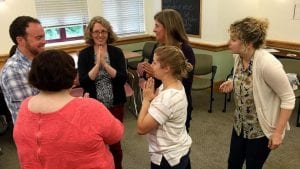
For many researchers, telling a great story can be a challenge, but a group of two-dozen faculty, post-docs, and graduate students at the University of Oregon found the process got easier after spending two days sharpening their communication skills in a workshop led by faculty from the Alan Alda Center for Communicating Science at Stony Brook University.
Read the full article at the Research and Innovation website.
Find the permanent PDF version here.
The workshop was also featured in Around the O on June 1, 2015. Find the permanent PDF version here.
Extreme Makeover: Leaving the lecture behind in favor of active learning
By Greg Bolt
May 13, 2015
Okay, class, raise your hand if you spent most of your time in college sitting in a big room listening to a professor talk.
Thought so. Lecturing has dominated college classrooms for the last 800 years—they don’t call them “lecture halls” for nothing—and it’s a safe bet the lecture isn’t going away anytime soon. But some erstwhile lecturers at the UO are showing that for many classes, especially science, students learn more when professors talk less.
Read the full article in Cascade Magazine.
Find the permanent PDF version here.
UO 2015 Strategic Initiative to Fund Science Literacy Program
May 4, 2015
he SLP, co-operated under the College of Arts and Science, with Physics, Biology, Chemistry and Biochemistry, Geological Sciences, and Human Physiology, has been named a recipient of long-term recurring funding under the UO’s 2015 Strategic Initiative.
This award will provide stable funding for between 16 and 24 graduate SLP Fellows per year to work alongside faculty to co-develop and co-teach science courses for non-science majors. We will continue to provide professional development opportunities for faculty and students to learn about and use the best pedagogy for courses at this level. SLP is also moving toward supporting and impacting more ‘gateway’ courses for potential science majors.
Faculty and graduate students are encouraged to contact SLP staff to enquire about participating in the upcoming school year.
SLP Co-director Receives Thomas F. Herman Award for Excellence in Pedagogy
May 4, 2015
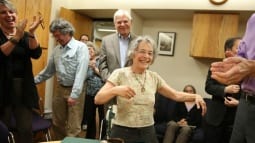
Judith Eisen, Co-Director of the Science Literacy Program, has been awarded the 2015 Thomas F. Herman Award for Excellence in Pedagogy awarded to a senior UO faculty member who has “demonstrated outstanding achievement and expertise” in pedagogy, for excellence in her own teaching, and her work directing the Science Literacy Program and the positive impact the program has had on thousands of students at the UO.
Read more about the 2015 Distinguished Teaching Awards winners at Around the O.
Find the permanent PDF version here.
SLP Featured in Chronicle of Higher Education
By Dan Berrett
May 4, 2015
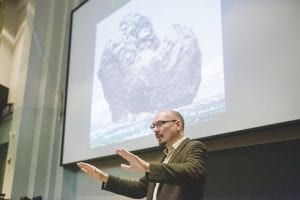 Scott Fisher gets a lot of educational mileage from a postcard. Each quarter Mr. Fisher, a lecturer in astronomy at the University of Oregon, asks students in his introductory course to write to him at his cosmic address. That means not only including his room number here in Willamette Hall and his ZIP code, 97403, but also locating him in the universe.
Scott Fisher gets a lot of educational mileage from a postcard. Each quarter Mr. Fisher, a lecturer in astronomy at the University of Oregon, asks students in his introductory course to write to him at his cosmic address. That means not only including his room number here in Willamette Hall and his ZIP code, 97403, but also locating him in the universe.
The extra-credit assignment serves one of Mr. Fisher’s main goals for the course: helping students develop a sense of scale, or what he calls “a cosmic perspective.” Along the way, he hopes to firm up their tenuous grasp of scientific reasoning and make them more comfortable with science. That’s the idea behind several revamped courses in biology, chemistry, geology, and physics at Oregon, to raise an often paltry level of science literacy among nonmajors.
Read the full article online in the Chronicle of Higher Education.
Find the permanent PDF version here.
National food association honors teaching approach of UO’s ‘Bread 101’
April 13, 2015
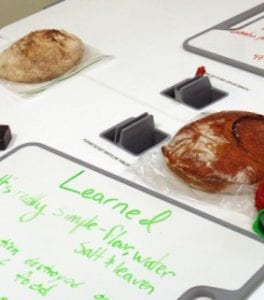 Bread 101, a course offered last spring in the UO’s Robert D. Clark Honors College, has won the 2015 Pedagogy Award from the Association for the Study of Food and Society for its innovative interdisciplinary and hands-on approach for teaching about food.
Bread 101, a course offered last spring in the UO’s Robert D. Clark Honors College, has won the 2015 Pedagogy Award from the Association for the Study of Food and Society for its innovative interdisciplinary and hands-on approach for teaching about food.
As an experimental offering in the Clark Honors College, Bread 101 also served as a course development laboratory for the UO’s Science Literacy Program, which seeks to improve general science literacy courses.
Read the article in Around the O.
Find the permanent PDF version here.
Bread 101
By Bonnie Henderson
March 2, 2015
Simple carb. Staff of life. Sacrament, mitzvah, the very body of Christ. Prisoner’s rations. The highest expression of the baker’s art. Irritant, allergen, toxin.
Bread has been baked and consumed, in one form or another, for at least 10,000 years. It requires only four simple ingredients. Yet everything about it—on close examination—is complex, from the interaction of those ingredients in the rising dough to the social and political history bread has been shaped by and has helped to shape. No surprise, then, that when five University of Oregon professors—food lovers all—met last year to kick around ideas for an interdisciplinary life science–humanities honors college colloquium organized around one foodstuff or another, bread quickly emerged as the obvious focus.
Read the full article online at Oregon Quarterly.
Find the permanent PDF version here.
In a Clark Honors College course, the bread dough did rise
By Jim Barlow
July 3, 2014
Mix 19 upper-level undergraduate students from the Robert D. Clark Honors College with five faculty members from biology, physics and literature for 10 weeks and you’ll get bread: yeast, rye, wheat, white, sourdough and Russian.
“Bread 101” was offered spring quarter as an experimental colloquium. On the final day, as everyone detailed what they had learned and bread smells filled the classroom, it was clear the course had not been a half-baked idea.
Read the full article at Around the O.
Find the permanent PDF version here.
Three of the faculty blogged about their experiences during the term as well.
- Fairmount Neighborhood Farmers Market post about Bread Starter
- Culinaria Eugenius post about the Bread 101 course
- Eggsasparagus with several posts about the Bread 101 course and learning experience
Four UO Faculty Participate in Summer Academy
June 30, 2014
Four UO representatives participated in the West Coast National Academies Summer Institute on Undergraduate Education at University of California, Riverside in June.
Throughout the National Academies Summer Institute, they focused on applying research on how people learn to develop and create undergraduate science classroom activities. Following the completion of the program Michelle Wood (Professor of Biology), Ann Petersen (Postdoctoral Research Associate in the Institute of Ecological and Evolution) and Elizabeth “Tish” Toomey Wiles (Postdoctoral Research Associate in the Institute of Molecular Biology) have been named National Academies Education Fellows in the Life Sciences for 2014-15 and Eleanor “Elly” Vandegrift (Associate Director of the Science Literacy Program and Senior Instructor of Biology) has been named a National Academies Education Mentor in the Life Sciences for 2014-15.
Read more about the Summer Institute at UCR Today.
Find a permanent PDF version of the article here.
Science Literacy Program Community of Practice
December 14, 2014
Life Science Teaching Resource Community Blog
We also have cultivated a science education community of practice at the University of Oregon (UO) that follows many of your recommendations. In 2010 the UO Science Literacy Program (SLP, scilit.uoregon.edu), funded in part by HHMI, and UO Teaching Effectiveness Program (TEP, tep.uoregon.edu) teamed up to offer a science education journal club for participants interested in implementing active learning. SLP focuses on improving general education courses in the sciences by adopting evidence-based, student-centered teaching and providing mentored teaching opportunities for graduate and undergraduate students. TEP is the campus professional development center for faculty and graduate students interested in implementing best teaching practices. Our journal club is currently organized and facilitated by the associate director of the SLP and a faculty consultant from TEP.
The journal club began with a grassroots effort by science faculty and graduate students to support and encourage more effective teaching. From the beginning, we have offered two sections to accommodate a diversity of schedules. While each meeting is anchored with a reading (our extended bibliography may be found at https://scilit.uoregon.edu/journal-club/bibliography/bibliography-by-topic/), we include small-scale teaching experiments, try out a diversity of pedagogical approaches together, and support exploration of theory. The community of practice also provides for future faculty and science communicators a training ground in pedagogical theory and practice. All this happens within an interdisciplinary, cross-rank community; the participant mix includes undergraduate students, graduate students, post-docs, librarians, and faculty from a wide variety of disciplines.
What started as a handful of individuals wanting to improve their teaching has developed into a supportive education community with 20-30 people attending each week (many of whom have been coming faithfully for several years) and over 350 people on our mailing list. The journal club is the one place where many of our participants have the space and time to discuss teaching innovations and challenges with colleagues. We have a community who now have a common language about science education and are challenging themselves to try new techniques to support student learning.
UO Science Literacy Program excels through active learning
By Lee Rumbarger
August 21, 2013
During a class earlier this year for Biology/Chemistry 140, biology professor Judith Eisen flashed this question on the front screen: Which of the following experimental results would allow you to conclude that a mutation in a specific gene caused disease symptoms?
A. Finding a correlation between the mutation and the disease.
B. Making the same mutation in an animal model and showing that this has disease symptoms.
C. Both A and B.
D. Neither.
Students answered on “clickers,” handheld devices that look like television remote controls. A graph illustrated their answers on screen. Most got it—“B”; but as other students explained their choices, Eisen was persuaded to refine the language of the question on the spot—it had left some wiggle room, the class decided. “C” might have been correct, too.
Read the full article at Around the O.
Find the permanent PDF version here.
The Science of Good Teaching: Program Invites Wide-Ranging Innovation
By Lee Rumbarger
June 27, 2013
It’s 2 o’clock on Monday of Week Nine. Professor of Biology Judith Eisen and Associate Professor of Chemistry Andy Berglund’s Biology/Chemistry 140: “Science, Policy, and Biology” students—just over 90 of them—are settling into pod-style tables dotting HEDCO 220. Today’s topic: genetic testing and gene modification. This is one of 21 new or significantly revised courses developed as part of the UO Science Literacy Program’s (SLP) four-year, $1.5 million Howard Hughes Medical Institute grant aimed at boosting public competence and interest in science through revived general education teaching. In addition to these courses, the SLP supports a weekly reading group about science pedagogy and a major assessment project.
Read the full article online at the Teaching Engagement Program blog.
Find a permanent PDF version here.
UO delegation leads faculty development event in Japan
April 30, 2013
A five-person delegation from the University of Oregon led a two-day faclty development workshop for instructors at Japan’s Nagoya University on March 16 and 17. Center for Asian and Pacific Studies director Jeff Hanes, along with Lee Rumbarger, director of the Teaching Effectiveness Program; Trish Pashby, senior instructor at the American English Institute; Georgeanne Cooper, former director of the Teaching Effectiveness Program; and Elly Vandegrift, associate director of the Science Literacy Program, comprised the team that facilitated the workshop.
Read the full article at Around the O.
Find the permanent PDF version here.
Video: UO program aims to improve science literacy
April 19, 2013
View Oregon Daily Emerald video featuring the SLP course GEOL 110.
Produced by Lelani Rapaport
SPUR internship leads UO undergrad into prestigious program
February, 2013
Research conducted as an intern in the University of Oregon’s Summer Program for Undergraduate Research (SPUR) not only sealed an interest in science by Christine Liu, it also landed her an award from the Howard Hughes Medical Institute to support her efforts.
Read the full article online from the Office of the Vice President for Research and Innovation.
Find the permanent PDF version here.
$1.5 million grant to change way many non-science students are taught at the UO
May 20, 2010
Non-science majors at the University of Oregon in the future will benefit from a $1.5 million grant that will have four departments working together to change the way they teach their courses. The grant to the UO was among $79 million in grants announced by the Howard Hughes Medical Institute to help universities strengthen undergraduate and precollege science education nationwide.
Read the full announcement online..
Find the permanent PDF version here.
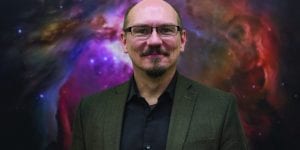 Dr. Scott Fisher has looked into other galaxies and worked for NASA, but he’s teaching a 100-level astronomy course at University of Oregon.
Dr. Scott Fisher has looked into other galaxies and worked for NASA, but he’s teaching a 100-level astronomy course at University of Oregon.